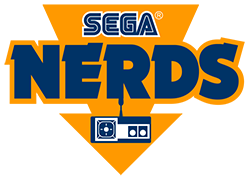
QUICK LOOK
AVERAGE
Average
A fun platforming romp, but far removed from classic Sonic gameplay and lightyears behind its contemporaries.
Back in 1996, the sun was setting on the Mega Drive‘s glory days, as future-conscious gamers began migrating to newly blooming 32 and 64-bit pastures. But that didn’t stop SEGA tasking Traveler’s Tales with giving the console’s most famous mascot one final 16-bit airing, in the form of Sonic 3D, or Sonic 3D Blast in the US.
Despite being developed in tandem with the ill-fated Sonic X-treme, and ported to the Saturn as something of a contingency plan when that project imploded, Sonic 3D remains a Mega Drive game through and through, in that its concept and execution clearly have the console’s limitations in mind.
A New Dimension

2D Sonic games are typically horizontal, leftward sprints to the finish, but Sonic 3D bucks this trend in a number of ways. Most obviously, the game is played from an isometric viewpoint, dragging the blue ‘hog kicking and screaming into the third dimension.
In addition, there’s more to be done this time around than simply reaching the end-of-level goal post. Acts are split into sub sections, each containing five robotic enemies with a helpless bird, or ‘Flicky’, trapped inside. To progress, you must destroy these and escort said avian refugees to an extraction point of sorts without incident. They’ll form a train behind you once collected, which will break if you, or they, take damage. Should that happen, you’ll need to recollect them quickly, lest they wander the landscape aimlessly.
Owing to the above focus on collecting wayward wildlife, things move along at a more ponderous pace than series veterans might be used to. Sonic himself is far less sprightly than usual, as speed in general is de-emphasised significantly. There are a few sporadic gated sections that see Sonic forced into a swift spin dash through a couple of loops and out of the other end, but these are mostly non-interactive. In hindsight, they are perhaps something of a precursor to Sonic Adventure‘s similarly hands-off set pieces.

Also of note is the fact that while the environments are varied and detailed, Sonic can only actually walk on the coloured tiles that are mostly in the middle of any given area. Although many of the later levels are certainly large enough to get lost in, the clear and ever present invisible line between where you can and can’t go leaves things feeling rather restrictive.
End-of-level bosses are, of course, present and correct, and really benefit from the jump to 3D. Many of their concepts would be unworkable in a more standard sidescroller, yet remain broadly faithful to Yuji Naka‘s original Sonic fundamentals. In fact, the numerous interesting encounters with perennial series antagonist, Robotnik/Eggman, are the game’s saving grace from a gameplay perspective.
Smoke and Mirrors
Sonic 3D’s graphics are almost entirely pre-rendered. This means that many of the models and assets would have originally been drawn in 3D on, at the time, state-of-the-art PCs before being converted to sprites for in-game use. This approach was common back in the mid ’90s as a way of allowing then aging 16-bit consoles to produce visuals far beyond their own raw capabilities. Notable examples of this technique include Rise of The Robots, Donkey Kong Country and Clayfighter.

But the results here are mixed. Environments and enemies look acceptable, but Sonic himself is oddly proportioned, with uncharacteristically gangly limbs. Also, the colours on him and the unplayable supporting cast don’t look as rich and vibrant as they should. The Saturn version includes some minor visual embellishments, but fares little better on the whole, which is a shame considering the console’s impressive 2D chops. In fact, the only major gameplay change is to the on-the-rails special stages, which look completely different on the Saturn and are a lot smoother and more satisfying to play. Their premise, collecting rings to gain Chaos Emeralds, remains the same, however.
Additionally, on the subject of differences between the two versions, it’s worth mentioning that their soundtracks are very dissimilar. The Mega Drive one is the stronger offering in terms of composition, but the Saturn tracks are realised in much higher fidelity owing to the increased storage space offered by CD-ROMs over cartridges. The short FMV intro sequence also looks noticeably slicker on the Saturn, again, presumably due to it having to be compressed to within an inch of its life to fit onto a humble 32 Megabit cart for the Mega Drive version.
A False Start

Sonic 3D has always been the black sheep of Sonic’s Mega Drive offerings because of how far it strays from the original Sonic concept. You could even go as far as to say that the Sonic-related assets the game uses are purely incidental. The pre-rendered graphics here have not aged particularly well, and when you consider that Super Mario 64 was released in the same year as Sonic 3D (in Japan, at least), it’s hard not to feel like the game was very much behind the technological curve.
Summary
Sonic 3D is an unremarkable isometric platformer that does little to justify its place in a series that, when all said it done, it has little in common with. While available for a pittance pre-owned and and on countless digital storefronts, Sonic 3D is one for completists only.
All that said, it might make an interesting addition to the ongoing 3DS-exclusive 3D Classics initiative, if you’re listening, M2?
Pros
+ Interesting boss fights
+ Mega Drive version’s soundtrack pretty good
+ Serviceable platforming action
Cons
– Dated graphics
– Little in common with other Sonic games
– Saturn port takes little advantage of the console’s additional horespower






